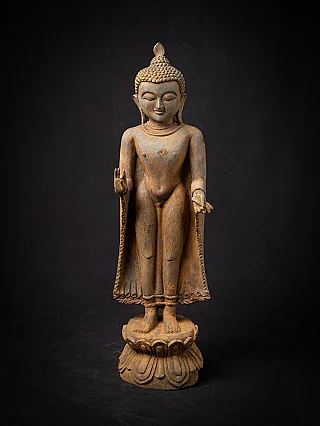The Benefits of Practicing Buddhism in Modern Times
Author : Peter Vredeveld

Buddhism has existed for thousands of years and has become a widely recognized philosophy worldwide. Although it is an ancient practice, Buddhism's benefits continue to apply in modern times. Beyond just spirituality, practicing Buddhism offers several advantages that are particularly relevant to people today. In this article, we will explore some of the key benefits of practicing Buddhism in the present day.
Achieve Spiritual Growth with Our Collection of Buddha Statues
Reduced Stress and Anxiety
Practicing Buddhism offers a notable advantage in reducing stress and anxiety, which are increasingly common issues in the fast-paced, high-stress lifestyles of many individuals. The philosophy of Buddhism teaches the practice of mindfulness, which involves focusing on one's thoughts, emotions, and surroundings to be fully present in the moment. The central practice of mindfulness meditation, which is integral to Buddhism, has been shown to decrease levels of stress, anxiety, and depression.
In today's world, it is not uncommon for individuals to experience stress and anxiety. These conditions can have a significant impact on one's physical and mental health, leading to problems like high blood pressure, heart disease, and depression. Mindfulness meditation can help to alleviate these symptoms by promoting relaxation and reducing the levels of stress hormones in the body. It can also help individuals better understand their thoughts and emotions, improving mental clarity and emotional stability.
Meditate with Our Buddha Statues
Improved Mental Health

Scientific research suggests that Buddhism can enhance mental health in various ways. Consistent meditation, a core component of Buddhism, has been found to provide relief for mental health conditions like depression, anxiety, and ADHD. Additionally, Buddhism promotes compassion, which can help individuals develop empathy, reduce anger, and improve relationships with others. By practicing Buddhism, individuals can better understand their thoughts and emotions, improving mental clarity and emotional stability.
Meditation is an effective treatment for mental health conditions. It can help to reduce the symptoms of depression and anxiety, as well as improve attention and focus in individuals with ADHD. Moreover, compassion can help individuals develop a more positive outlook on life, leading to greater happiness, fulfillment, and success. Individuals can experience spiritual growth and improve their mental health by cultivating mindfulness and compassion.
It's important to note that Scientific research supports the benefits of practicing Buddhism. For example, a 2016 study published in the Journal of Clinical Psychology found that mindfulness meditation can lead to significant reductions in symptoms of depression and anxiety. Similarly, a 2019 review published in the Journal of Attention Disorders found that mindfulness meditation can be an effective treatment for ADHD. However, it's essential to acknowledge that every individual's experience may vary and that the specific benefits of Buddhism may depend on the individual's commitment to the practice, circumstances, and other factors.
Greater Self-Awareness
Buddhism strongly emphasizes self-awareness, which is understanding oneself and one's actions. Through mindfulness practices, individuals can gain greater awareness of their thoughts, feelings, and actions. Individuals can positively change their behavior and thought processes by recognizing these patterns. This heightened self-awareness can help individuals better understand their values, goals, and purpose, ultimately leading to greater fulfillment and satisfaction.
Scientific research has demonstrated the various benefits of practicing self-awareness. For instance, a 2018 study published in the Journal of Personality and Social Psychology found that more self-aware people have better mental health outcomes and are more successful in their relationships and careers. Furthermore, a 2019 study published in the Journal of Happiness Studies found that self-awareness positively correlates with subjective well-being and life satisfaction. Mindfulness practices, identified in the survey, facilitate the development of self-awareness, allowing individuals to enhance their awareness of thoughts, emotions, and behaviors. In addition, a 2020 study published in the Journal of Applied Psychology found that self-awareness is essential for effective leadership. Self-aware leaders are better able to manage their emotions and respond to the needs of their employees, resulting in improved job satisfaction and performance. Self-awareness can profoundly impact an individual's well-being and success, making it essential to personal growth and development.
Increased Empathy

As mentioned earlier, Buddhism strongly emphasizes compassion, which can help individuals develop empathy and the ability to understand and share the feelings of others. Developing empathy can lead to many positive outcomes, including improved relationships, better communication, and greater understanding and tolerance of differences.
Scientific research has demonstrated the benefits of empathy and compassion in various settings. For example, a 2019 study published in the Journal of Happiness Studies found that higher levels of compassion were positively associated with greater life satisfaction and happiness. In addition, a 2017 study published in the Journal of Social Psychology found that compassion was positively associated with better relationship quality, including increased satisfaction and commitment.
By practicing Buddhism and cultivating compassion and empathy, individuals can develop a more positive outlook on life and improve their relationships with others, leading to greater overall happiness, fulfillment, and success.
Discover the Benefits of Buddhist Mudras
Spiritual Growth

Practicing Buddhism can bring significant benefits in modern times, such as reducing stress and anxiety, improving mental health, increasing self-awareness, developing empathy, and experiencing spiritual growth. Scientific research has proven that consistent meditation can help alleviate conditions such as depression, anxiety, and ADHD. At the same time, the principle of compassion taught by Buddhism promotes better relationships, communication, and tolerance. Additionally, mindfulness and self-awareness can help individuals positively change their behavior and thought processes, leading to greater fulfillment and satisfaction. By recognizing the interconnectedness of all beings, practicing Buddhism can bring about a greater sense of purpose and contentment.
Beyond the individual benefits of Buddhism, the philosophy also emphasizes the importance of collective well-being. Buddhism teaches that all beings are interconnected and that one individual's actions can impact others. This principle of interconnectedness encourages individuals to cultivate a sense of responsibility and compassion for others. With the many global challenges we face, such as climate change, economic inequality, and social injustice, the principle of interconnectedness and the sense of responsibility it fosters can be a powerful force for positive change.
Conclusion
In summary, practicing Buddhism can bring many benefits in modern times, including reduced stress and anxiety, improved mental health, increased self-awareness, greater empathy, and spiritual growth. Scientific research supports these benefits, contributing to individuals living more fulfilling lives. By recognizing the interconnectedness of all beings and cultivating compassion and responsibility, individuals can also contribute to the collective well-being of society. Whether you are interested in Buddhism for its benefits or its potential for positive social change, it is a philosophy with much to offer in modern times.
Share this page














































